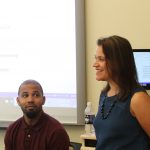“Mental health issues should no longer be placed on the backburner. All struggles are valid, no matter what generational differences there are. Having conversations and normalizing mental health care within families can help reduce the stigma. Increasing funding and access to mental health resources is a necessary next step, with a focus on hiring better trained staff in a culturally contemptuous background,” says Megan Go, a graduate student studying Higher Education and Student Affairs at the University of Connecticut.
A program specialist for University Events and Conference Services at the University of Connecticut, alumna Anne Hill ’90 (CLAS), ’92 MA, has been planning events across campus for nearly 24 years. When the COVID-19 pandemic hit last spring, Hill and her team had to uproot the strategies they had been using to design in-person events and pivot to online platforms.
“I think we all suspected that we would find a relationship between the racism online in social media and student mental health,” says lead author Adam McCready, an assistant professor-in-residence with UConn’s Neag School of Education. “I think we may have been a little surprised that it was more salient, or held a stronger relationship, than in-person experiences.”
“I want to take the information my students trusted me with and give it a voice, give it a platform, allow it to start new conversations, and new ways of thinking,” says Truth Hunter ’14 MA, Neag School of Education Dean’s Doctoral Scholar. “That is how I hope to use my experience as a Dean’s Doctoral Scholar.”
“The expansion of college campuses into urban areas contributes to the issue of gentrification, as colleges and universities have the ability to impact the socio-cultural landscapes of the communities they choose to inhabit,” says Santana Mowbray, a graduate student in the Higher Education and Student Affairs program.
Two years into her position as director of UConn’s master of science in business analytics and project management (MSBAPM) program, HESA alumna Meghan Hanrahan ’04 MA is thriving. She loves her work, the MSBAPM program’s enrollment is on the rise, and Hanrahan herself was recently featured in Hartford Business Journal’s 2018 “40 Under 40” issue. “I feel like I’m exactly where I should be,” she says. So how, exactly, did she get here?
Lisa Famularo: Our primary role is to work with CLAS faculty and staff to make sure that the career-related needs of CLAS students are being met. We not only carry out the programs that the CCD offers to all students, but we also tailor these resources to the unique needs of CLAS majors.
Louis Cameron III ’16 MA, an alum of the Neag School’s Higher Education and Student Affairs (HESA) program, is no stranger to exploring new communities, having been born in Würzburg, Germany, and having lived in or visited Georgia, Maryland, Virginia, North Carolina, Costa Rica, Spain, Germany, Italy, Portugal, Boston, New York City, San Antonio, Washington, D.C., and San Francisco.
A faculty member as well as interim director for the Neag School’s Higher Education and Student Affairs (HESA) program, Milagros Castillo-Montoya has brought along her knowledge and passion for teaching and learning in classrooms with diverse college students.
Assistant professor Milagros Castillo-Montoya will serve as interim director of the Neag School’s Higher Education and Student Affairs (HESA) program for one year, the Department of Educational Leadership announced earlier this month.





